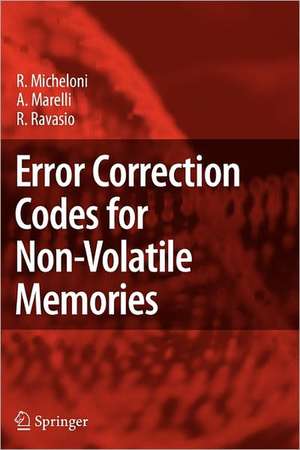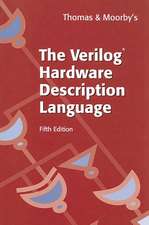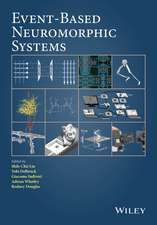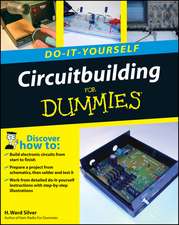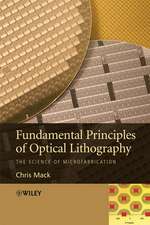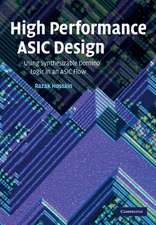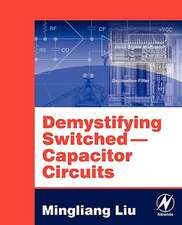Error Correction Codes for Non-Volatile Memories
Autor Rino Micheloni, A. Marelli, R. Ravasioen Limba Engleză Paperback – 19 oct 2010
In ECC for Non-Volatile Memories the authors expose the basics of coding theory needed to understand the application to memories, as well as the relevant design topics, with reference to both NOR and NAND Flash architectures. A collection of software routines is also included for better understanding.
The authors form a research group (now at Qimonda) which is the typical example of a fruitful collaboration between mathematicians and engineers.
| Toate formatele și edițiile | Preț | Express |
|---|---|---|
| Paperback (1) | 947.18 lei 6-8 săpt. | |
| SPRINGER NETHERLANDS – 19 oct 2010 | 947.18 lei 6-8 săpt. | |
| Hardback (1) | 953.20 lei 6-8 săpt. | |
| SPRINGER NETHERLANDS – 9 iun 2008 | 953.20 lei 6-8 săpt. |
Preț: 947.18 lei
Preț vechi: 1155.11 lei
-18% Nou
Puncte Express: 1421
Preț estimativ în valută:
181.27€ • 187.26$ • 150.86£
181.27€ • 187.26$ • 150.86£
Carte tipărită la comandă
Livrare economică 25 martie-08 aprilie
Preluare comenzi: 021 569.72.76
Specificații
ISBN-13: 9789048178643
ISBN-10: 9048178649
Pagini: 352
Ilustrații: XII, 338 p.
Dimensiuni: 155 x 235 x 18 mm
Greutate: 0.49 kg
Ediția:Softcover reprint of hardcover 1st ed. 2008
Editura: SPRINGER NETHERLANDS
Colecția Springer
Locul publicării:Dordrecht, Netherlands
ISBN-10: 9048178649
Pagini: 352
Ilustrații: XII, 338 p.
Dimensiuni: 155 x 235 x 18 mm
Greutate: 0.49 kg
Ediția:Softcover reprint of hardcover 1st ed. 2008
Editura: SPRINGER NETHERLANDS
Colecția Springer
Locul publicării:Dordrecht, Netherlands
Public țintă
ResearchCuprins
Basic coding theory.- Error Correction Codes.- NOR Flash memories.- NAND Flash memories.- Reliability of floating gate memories.- Hardware implementation of Galois field operators.- Hamming code for Flash memories.- Cyclic codes for non volatile storage.- BCH hardware implementation in NAND Flash memories.- Erasure technique.
Notă biografică
Rino Micheloni received the Laurea degree (cum laude) in nuclear engineering from the Politecnico of Milan in 1994. From 1995 to 2006 he was with STMicroelectronics where he led the design activities on NOR and NAND Multilevel Flash memories. Currently, he is Senior Principal Engineer for Flash Design at Qimonda. In 2003 he was Co-Guest Editor for the Special Issue of the Proceedings of the IEEE on Flash Memories .
Mr. Micheloni has been involved with the following book projects: "VLSI-Design of Non-Volatile Memories, Springer-Verlag, 2005; Chapter 6 in "Floating Gate Devices: Operation and Compact Modeling, Kluwer Academic Publishers, 2004; Chapter 5 in "Flash Memories, Kluwer Academic Publishers, 1999. Mr. Micheloni is a Senior IEEE member and has authored more than 100 patents issued in Europe, Japan and USA.
Ravasio Roberto was born in Carvico (BG) in 1966. He graduated at the Politecnico of Milan in 1996. From 1996 to 2000 he worked for Italtel-Siemens as a designer of radio mobile systems. From 2000 to 2006 he was at STMicroelectronics and since 2007 he is working for Qimonda. He has developed NOR and NAND multilevel Flash memories with embedded Hamming and BCH ECC. He is author of several patents and papers.
Marelli Alessia was born in Bergamo in 1980. She took her degree in Mathematic Science at Universita’ degli Studi di Milano – Bicocca with a thesis concerning error correction codes applied to Flash Memories. The thesis work was accompanied with a stage at STMicroelectronics in Agrate Brianza. From 2003 to 2007 she worked at STMicroelectronics taking care of ECC applied to memories and of digital design of Multilevel NAND. From 2007 she works at Qimonda as a digital designer. She is co-author of some patents regarding error correction codes.
Mr. Micheloni has been involved with the following book projects: "VLSI-Design of Non-Volatile Memories, Springer-Verlag, 2005; Chapter 6 in "Floating Gate Devices: Operation and Compact Modeling, Kluwer Academic Publishers, 2004; Chapter 5 in "Flash Memories, Kluwer Academic Publishers, 1999. Mr. Micheloni is a Senior IEEE member and has authored more than 100 patents issued in Europe, Japan and USA.
Ravasio Roberto was born in Carvico (BG) in 1966. He graduated at the Politecnico of Milan in 1996. From 1996 to 2000 he worked for Italtel-Siemens as a designer of radio mobile systems. From 2000 to 2006 he was at STMicroelectronics and since 2007 he is working for Qimonda. He has developed NOR and NAND multilevel Flash memories with embedded Hamming and BCH ECC. He is author of several patents and papers.
Marelli Alessia was born in Bergamo in 1980. She took her degree in Mathematic Science at Universita’ degli Studi di Milano – Bicocca with a thesis concerning error correction codes applied to Flash Memories. The thesis work was accompanied with a stage at STMicroelectronics in Agrate Brianza. From 2003 to 2007 she worked at STMicroelectronics taking care of ECC applied to memories and of digital design of Multilevel NAND. From 2007 she works at Qimonda as a digital designer. She is co-author of some patents regarding error correction codes.
Textul de pe ultima copertă
After "A Mathematical theory of communication" by C. E. Shannon, the 'Coding Theory' has begun its tremendous development as interface between Engineering, Computer Science and Mathematics. Contributions by mathematicians have focused on the design of new codes and the study of their properties, while contributions by engineers have focused on efficient implementations of encoding/decoding schemes. The research activities in Coding Theory have produced a vast range of different codes (with usually several alternative encoding/decoding algorithms), and their availability has pushed for new applications. Nowadays it is hard to find an electronic device which does not use codes: for example, we listen to music via heavily encoded audio CD's and we watch movies via encoded DVD's. There is at least one area where the use of encoding/decoding is not so developed, yet: Flash non-volatile memories. Flash memory high-density, low power, cost effectiveness, and scalable design make it an ideal choice to fuel the explosion of multimedia products, like USB keys, MP3 players, digital cameras and solid-state disk.
In ECC for Non-Volatile Memories the authors expose the basics of coding theory needed to understand the application to memories, as well as the relevant design topics, with reference to both NOR and NAND Flash architectures. A collection of software routines is also included for better understanding.
The authors form a research group (now at Qimonda) which is the typical example of a fruitful collaboration between mathematicians and engineers.
In ECC for Non-Volatile Memories the authors expose the basics of coding theory needed to understand the application to memories, as well as the relevant design topics, with reference to both NOR and NAND Flash architectures. A collection of software routines is also included for better understanding.
The authors form a research group (now at Qimonda) which is the typical example of a fruitful collaboration between mathematicians and engineers.
Caracteristici
Summary of basics in coding theory found in typical coding books which are mainly focused on mathematical aspects Examples of real applications of Hamming, BCH and Reed-Solomon codes Description of ECC inside NOR and NAND Flash memories Collection of software routines for encoding and decoding in Flash memories
